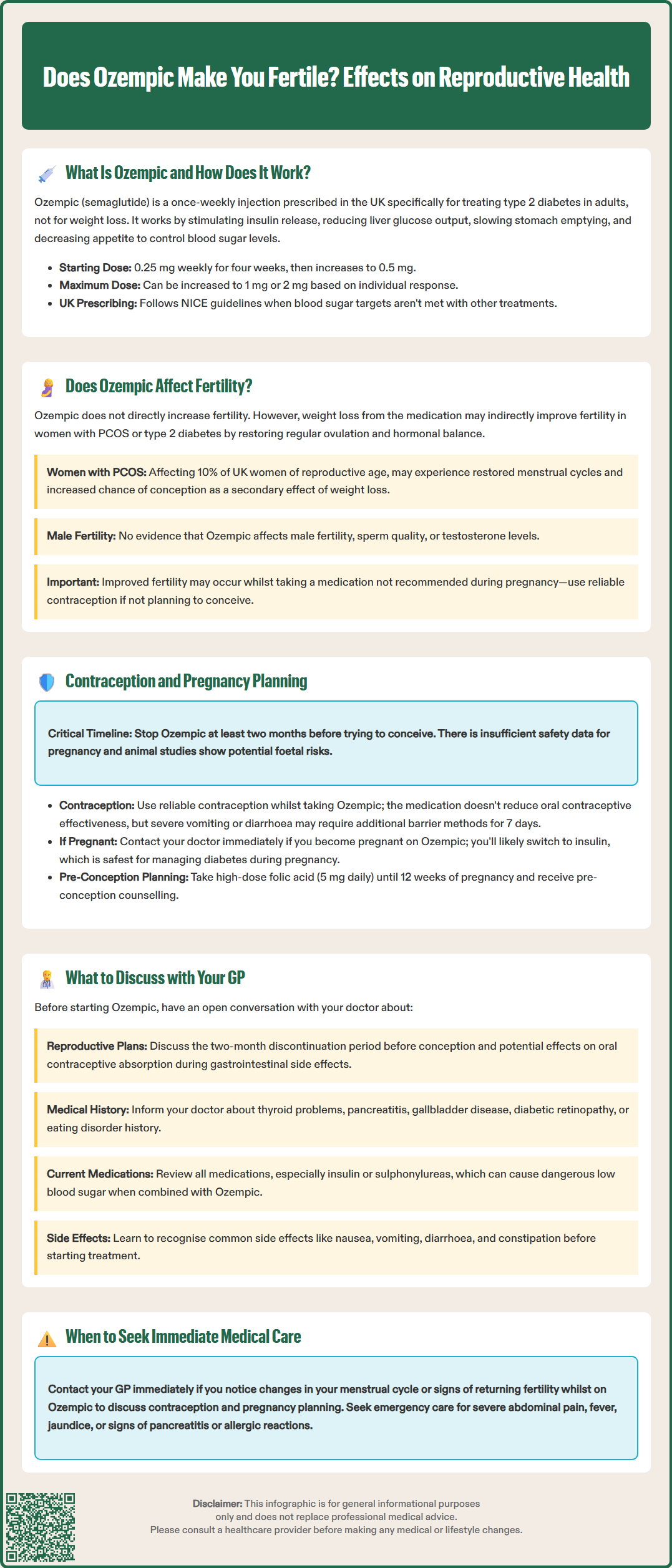
Ozempic (semaglutide) is a GLP-1 receptor agonist licensed in the UK for treating type 2 diabetes in adults. Whilst it does not directly increase fertility, the significant weight loss it can produce may indirectly restore ovulation in women with conditions such as polycystic ovary syndrome (PCOS) or obesity-related infertility. This potential improvement in fertility raises important considerations around contraception and pregnancy planning, as Ozempic is not recommended during pregnancy and must be stopped at least two months before conception. Understanding how Ozempic may affect reproductive health is essential for anyone of childbearing potential considering or currently taking this medication.
Quick Answer: Ozempic does not directly increase fertility, but the weight loss it produces may indirectly restore ovulation in women with PCOS or obesity-related infertility.

Mounjaro® is the most innovative GLP-1 medication proven to dramatically curb appetite, hunger, and cravings to help professional men achieve substantial weight loss.
Start Here
Wegovy® is a weekly injectable GLP-1 medication with proven effectiveness in reducing appetite, hunger, and cravings to help busy professionals lose significant weight.
Start HereOzempic (semaglutide) is a prescription medicine licensed in the UK for the treatment of type 2 diabetes mellitus in adults. It belongs to a class of medications called glucagon-like peptide-1 (GLP-1) receptor agonists, which work by mimicking the action of a naturally occurring hormone that helps regulate blood sugar levels.
The medication functions through several mechanisms:
Stimulating insulin release from the pancreas when blood glucose levels are elevated
Reducing glucagon secretion, which prevents the liver from releasing excess glucose
Slowing gastric emptying, which helps control post-meal blood sugar spikes
Reducing appetite through effects on brain centres that regulate hunger
Ozempic is administered as a once-weekly subcutaneous injection using a pre-filled pen device. The usual starting dose is 0.25 mg weekly for four weeks, then increased to 0.5 mg weekly. If additional glycaemic control is needed, the dose may be increased to 1 mg weekly, and subsequently to 2 mg weekly, depending on individual response and tolerability. In the UK, Ozempic is prescribed according to NICE guidelines for type 2 diabetes management (NG28), typically as part of dual or triple therapy when glycaemic targets are not met and where weight or cardiovascular considerations apply.
Whilst Ozempic has gained attention for its weight loss effects—which occur as a secondary benefit of its mechanism—it is important to understand that in the UK, it is not licensed as a weight loss medication. The related drug Wegovy (also semaglutide) is specifically licensed for weight management. The significant weight loss that can occur with Ozempic treatment has raised questions about potential effects on fertility, particularly in women with conditions like polycystic ovary syndrome (PCOS) where weight and metabolic health are closely linked to reproductive function.

Ozempic is not recommended during pregnancy, and the manufacturer advises that it should be discontinued at least two months before a planned pregnancy. This precautionary guidance exists because there is insufficient data on the safety of semaglutide during human pregnancy, and animal studies have shown potential risks to the developing foetus.
For women of childbearing potential taking Ozempic, reliable contraception is essential. According to the UK SmPC (Summary of Product Characteristics), semaglutide does not reduce the effectiveness of combined oral contraceptives, and additional contraception is not routinely required. However, if you experience severe vomiting or diarrhoea (common side effects of Ozempic), this may temporarily reduce the absorption of oral contraceptives, and additional barrier methods should be used during this time and for 7 days afterwards.
If you discover you are pregnant whilst taking Ozempic, you should contact your GP or diabetes specialist immediately. The medication should be stopped, and your diabetes management plan will need to be reviewed. Insulin is generally the preferred treatment for managing diabetes during pregnancy, as it does not cross the placenta and has an established safety profile. In some cases, metformin may be continued during pregnancy if clinically appropriate, as per NICE guidance (NG3).
Planning ahead is crucial: if you are considering pregnancy, discuss this with your healthcare team well in advance. They will help you transition to appropriate diabetes management that is safe during pregnancy, ensure your blood glucose is well controlled before conception (which improves pregnancy outcomes), and will recommend pre-conception counselling and folic acid supplementation (5 mg daily until 12 weeks of pregnancy for women with diabetes). The two-month washout period allows the medication to clear your system before conception occurs.
Before starting Ozempic, a comprehensive discussion with your GP or diabetes specialist is essential to ensure the medication is appropriate for your individual circumstances. Key topics to address include:
Reproductive plans and contraception:
Whether you are planning a pregnancy in the near future
Your current contraceptive method and understanding of potential effects of severe gastrointestinal symptoms on oral contraceptive absorption
Understanding the two-month discontinuation period required before conception
Fertility concerns or history of difficulty conceiving
Medical history and current health status:
Previous or current thyroid problems (Ozempic carries warnings about thyroid tumours based on animal studies)
History of pancreatitis or severe gastrointestinal disease
History of gallbladder disease (Ozempic may increase risk of gallstones)
Diabetic retinopathy (eye complications), as rapid glucose improvement may temporarily worsen this condition, particularly if you are already on insulin
Kidney function (while no dose adjustment is required for renal impairment, monitoring is important if dehydration occurs from gastrointestinal side effects)
Any history of eating disorders, given the appetite-suppressing effects
Current medications:
All prescription medicines, particularly other diabetes treatments (risk of hypoglycaemia when combined with insulin or sulphonylureas)
Over-the-counter medications and supplements
Oral medications that require consistent absorption
Your GP should also explain what to expect during treatment, including common side effects (nausea, vomiting, diarrhoea, constipation), how to administer the injection properly, and when to seek urgent medical attention. Red flags requiring immediate medical care include severe abdominal pain (particularly right upper quadrant pain which may indicate gallbladder problems), fever, jaundice, signs of pancreatitis, or allergic reactions. They should arrange appropriate monitoring, including regular HbA1c checks to assess diabetes control and periodic review of your treatment goals. You should also be advised how to report any suspected side effects via the MHRA Yellow Card scheme.
There is no official evidence that Ozempic directly increases fertility in either women or men. However, the relationship between Ozempic, weight loss, and fertility is complex and warrants careful consideration, particularly for women with certain underlying conditions.
Indirect effects on female fertility:
For women with polycystic ovary syndrome (PCOS)—a common cause of infertility characterised by insulin resistance, irregular periods, and difficulty conceiving—weight loss can significantly improve reproductive function. PCOS affects approximately 10% of women of reproductive age in the UK. When women with PCOS lose weight through any means (diet, exercise, or medication), they may experience:
Restoration of regular ovulation and menstrual cycles
Improved hormonal balance (reduced androgens, better insulin sensitivity)
Increased likelihood of spontaneous conception
Because Ozempic can lead to substantial weight loss, women with PCOS taking this medication may find that their fertility improves as a secondary consequence of metabolic improvement, not due to a direct effect of the drug itself. This potential restoration of fertility makes reliable contraception particularly important for women not planning pregnancy.
Similarly, women with type 2 diabetes and obesity who are not ovulating regularly may experience improved ovulatory function with significant weight loss and better glycaemic control.
Effects on male fertility:
There is currently no evidence that Ozempic affects male fertility, sperm quality, or testosterone levels. However, it's important to note that human data in this area are limited, and the available research has not identified concerns regarding male reproductive function.
Important considerations:
If you have been experiencing difficulty conceiving and notice changes in your menstrual cycle or other signs of returning fertility whilst taking Ozempic, contact your GP promptly. Remember that improved fertility whilst taking a medication not recommended in pregnancy creates a situation requiring careful contraceptive planning. Your healthcare team can provide guidance on managing your diabetes and weight whilst optimising your chances of a healthy pregnancy when the time is right.
Ozempic may indirectly improve fertility in women with PCOS through significant weight loss, which can restore regular ovulation and hormonal balance. However, this is a secondary effect of metabolic improvement rather than a direct action of the medication on reproductive function.
Ozempic should be discontinued at least two months before a planned pregnancy to allow the medication to clear your system. During this time, your healthcare team will help transition you to pregnancy-safe diabetes management, typically insulin.
There is currently no evidence that Ozempic affects male fertility, sperm quality, or testosterone levels. Available research has not identified concerns regarding male reproductive function with semaglutide use.
All medical content on this blog is created based on reputable, evidence-based sources and reviewed regularly for accuracy and relevance. While we strive to keep content up to date with the latest research and clinical guidelines, it is intended for general informational purposes only.
DisclaimerThis content is not a substitute for professional medical advice, diagnosis, or treatment. Always consult a qualified healthcare professional with any medical questions or concerns. Use of the information is at your own risk, and we are not responsible for any consequences resulting from its use.